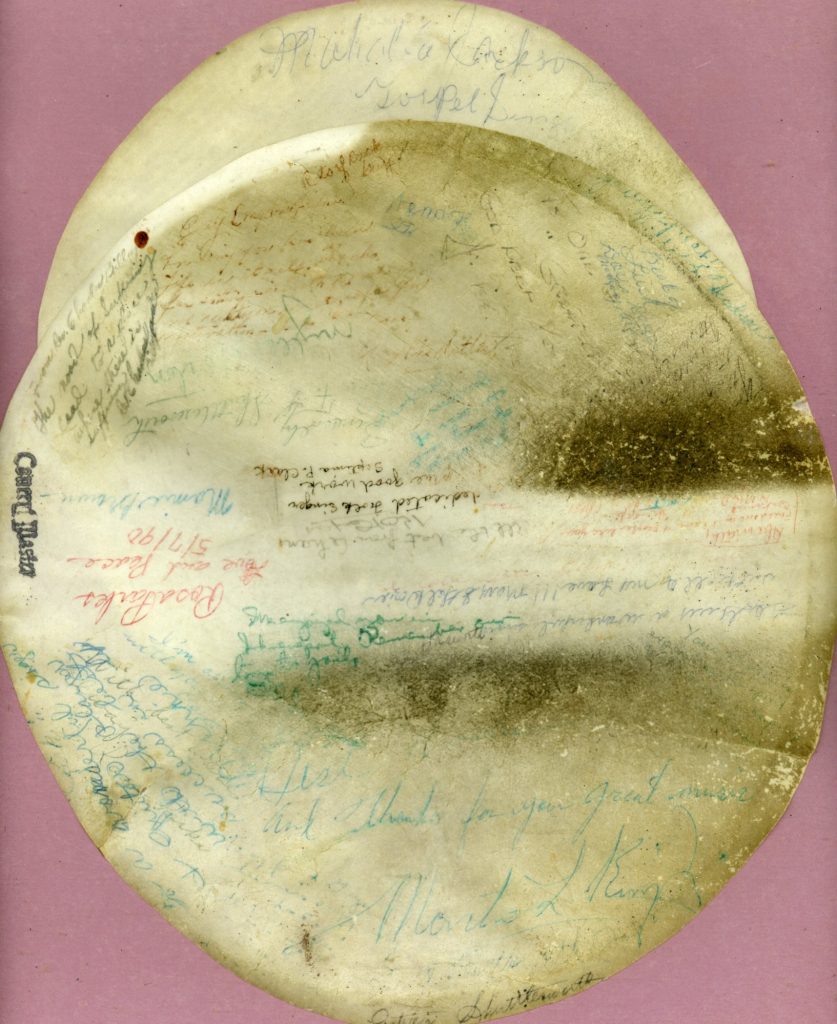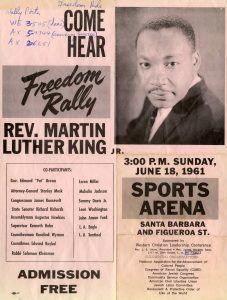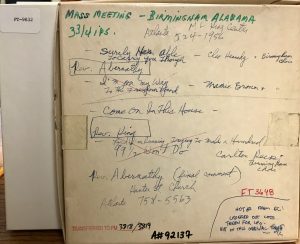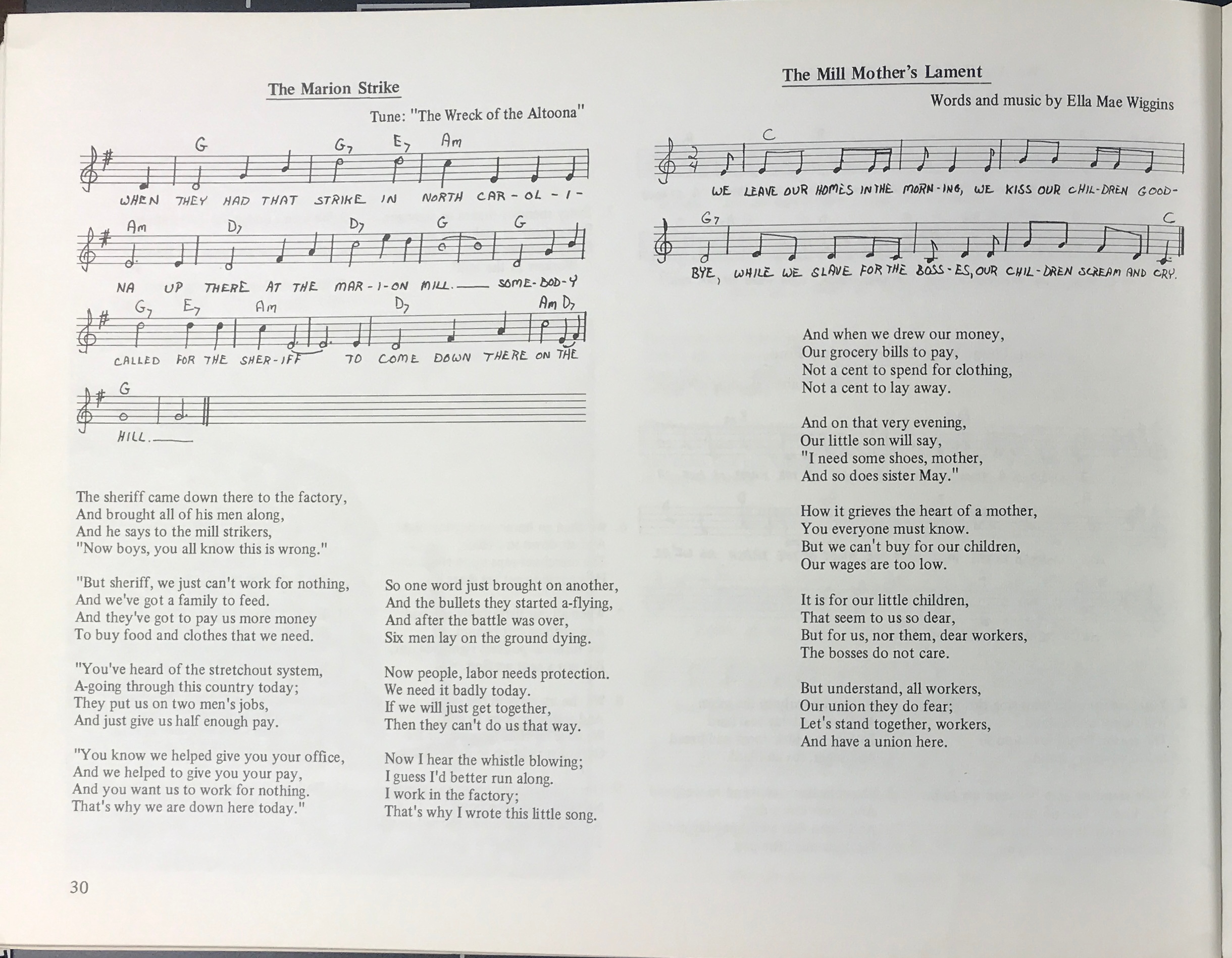
Today marks the 90th anniversary of the June 7th, 1929 violence at the Loray Mill Strike in Gastonia, North Carolina. The strike started in April of 1929 with the arrival of the National Textile Workers Union. The workers at the mill began striking for their demands. On June 7th sheriff’s deputies raided tents set up near the mill by striking workers. Violence ensued, and Police Chief Orville Aderholt was killed.
Just a few months after the culmination of the Loray Mill Strike, in September of 1929, Ella May Wiggins, a 29-year-old working mother and strike organizer, was killed by a mob of men trying to run the strikers out of town. The union was preparing for a large rally at which Ella May Wiggins would sing her ballads. On the way to the meeting, Ella May and other union members were attacked by anti-strikers. Ella May was one of many mill women and girls who protested the working conditions, hours and little pay in the Gaston County Mills in 1929. Often overlooked, the women working in the mills had a huge impact on the future of labor organizing in the South.
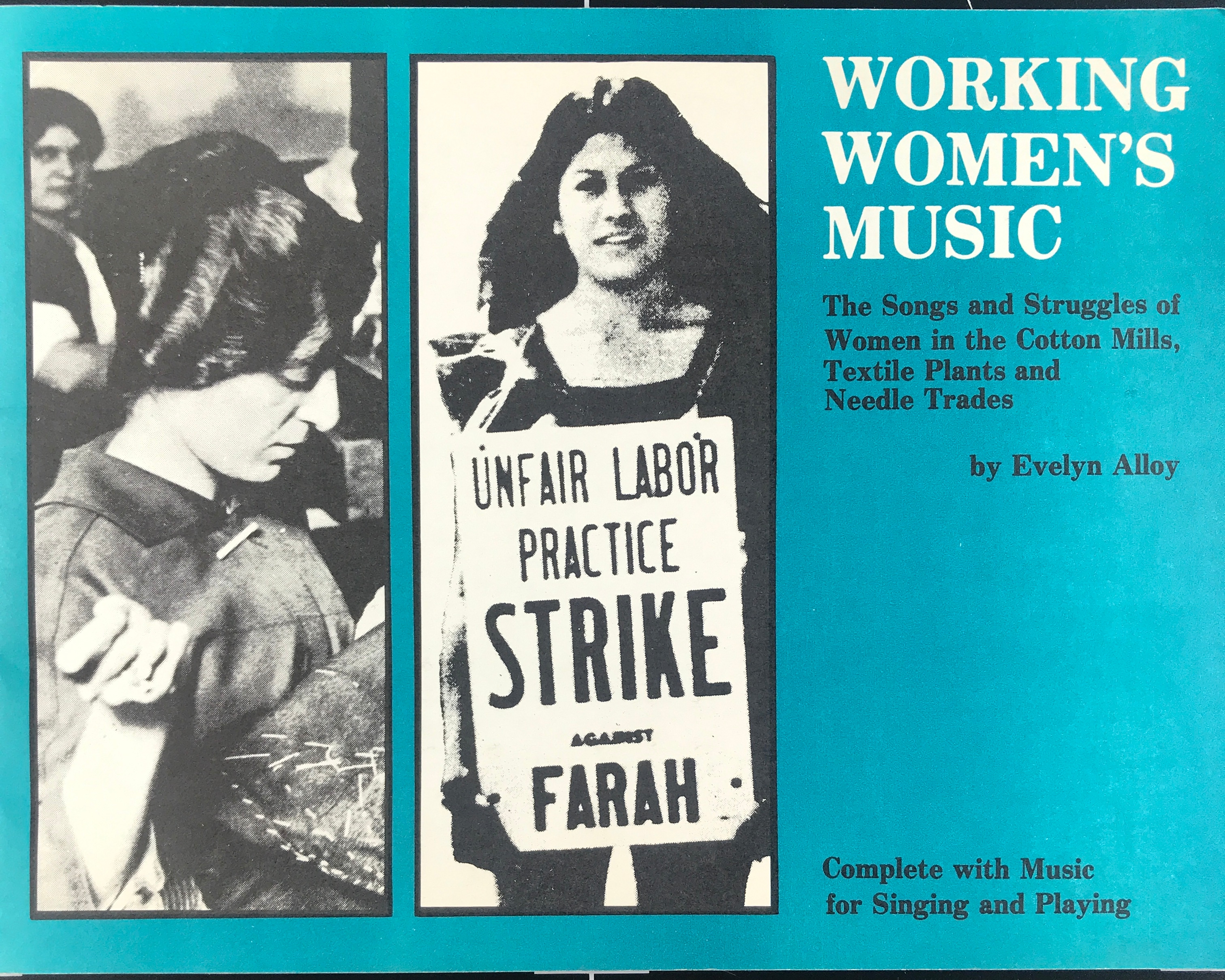
Ella May’s legacy lives on in the protest songs and ballads she wrote and sang. Her most popular protest song is “Mill Mother’s Lament,” a ballad covered by Pete Seeger on the album American Industrial Ballads.
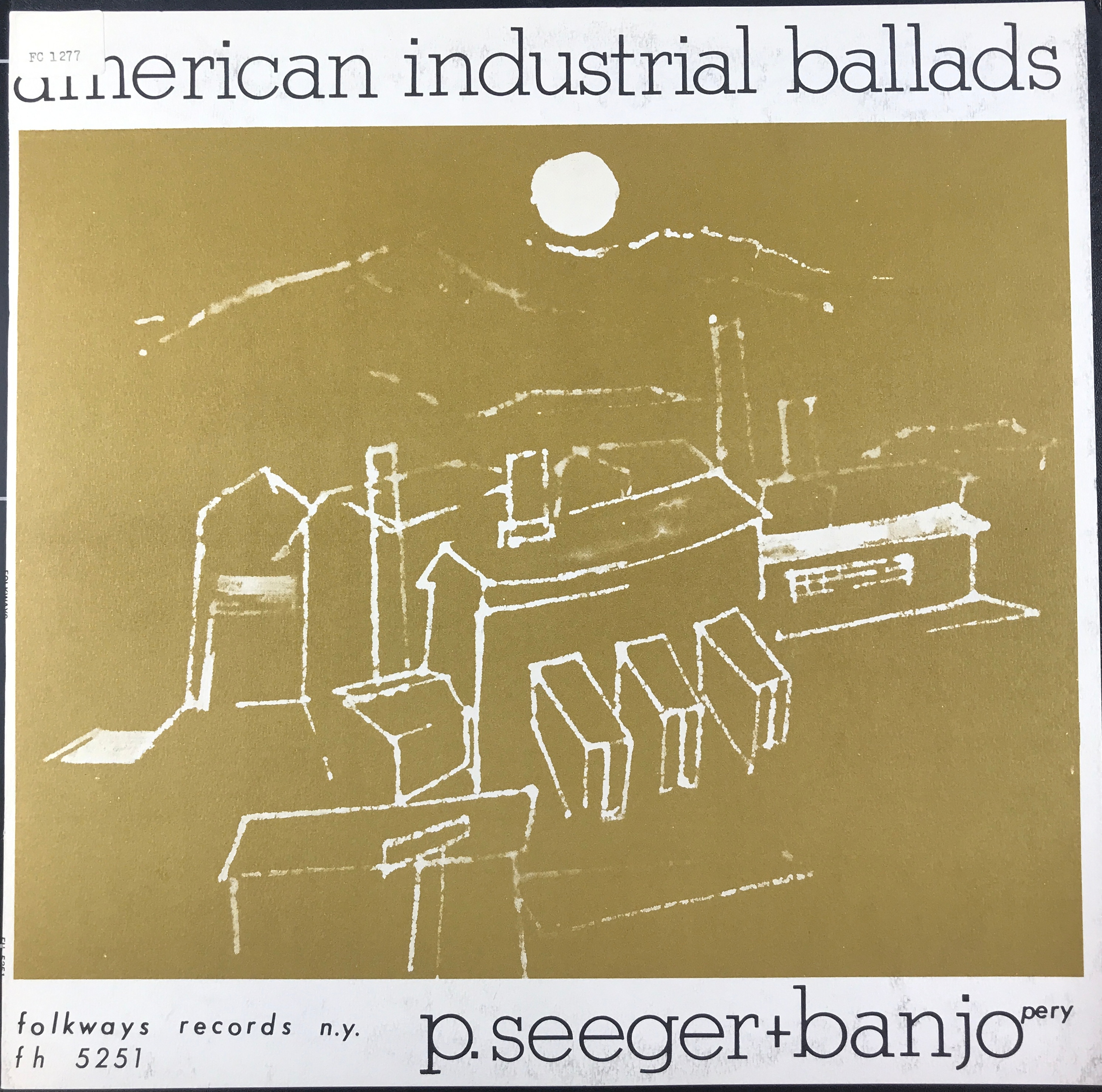
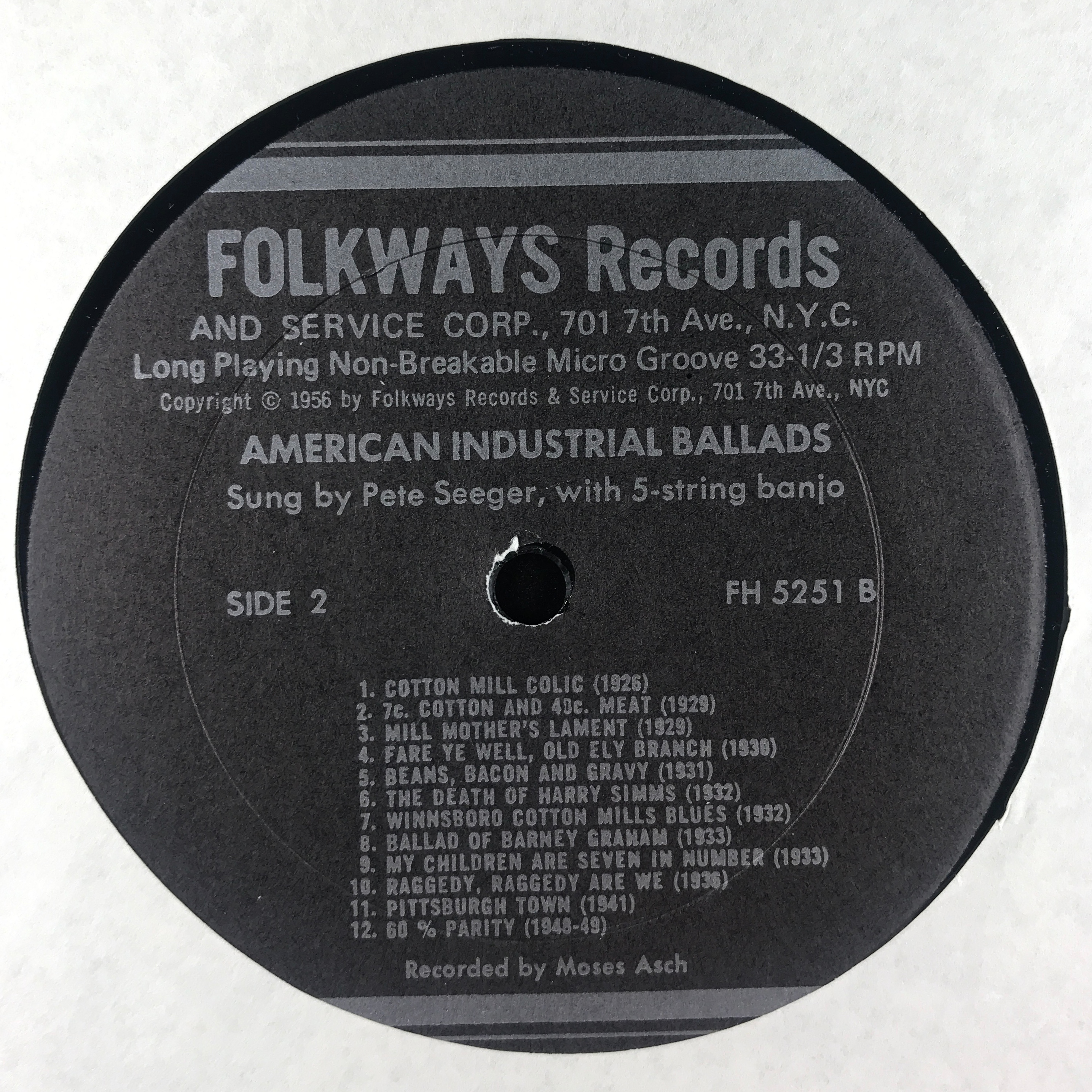
She also penned songs such as “The Big Fat Boss and the Worker” and “Up in Old Loray,” that were sung at union meetings and rallies. Some accounts say that Ella May did not write “Up in Old Loray,” but the lyrics in the Archie Green Collection have Ella May credited as the writer. Handwritten and typed copies of the lyrics to a few of her songs can be found in the Archie Green Papers.
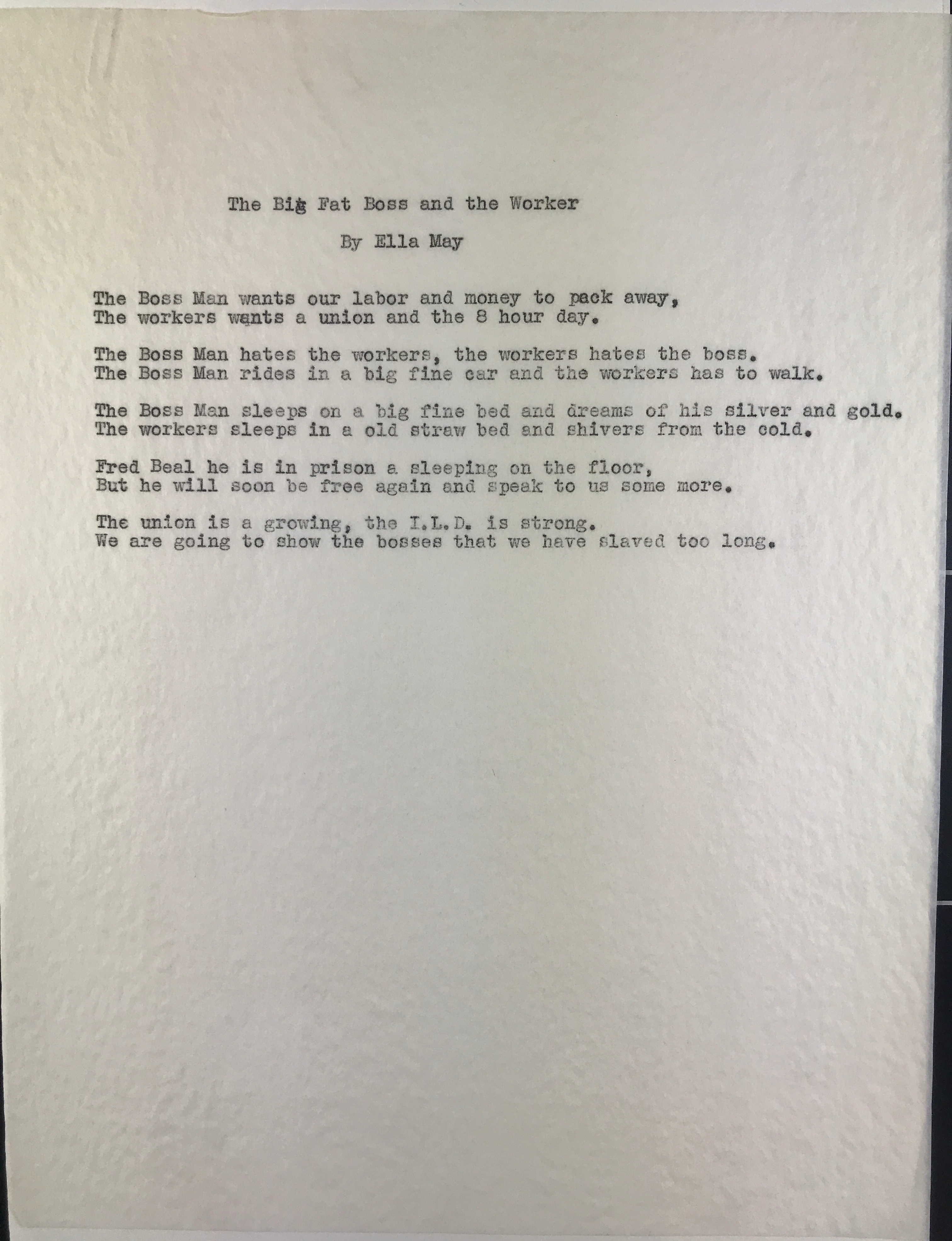
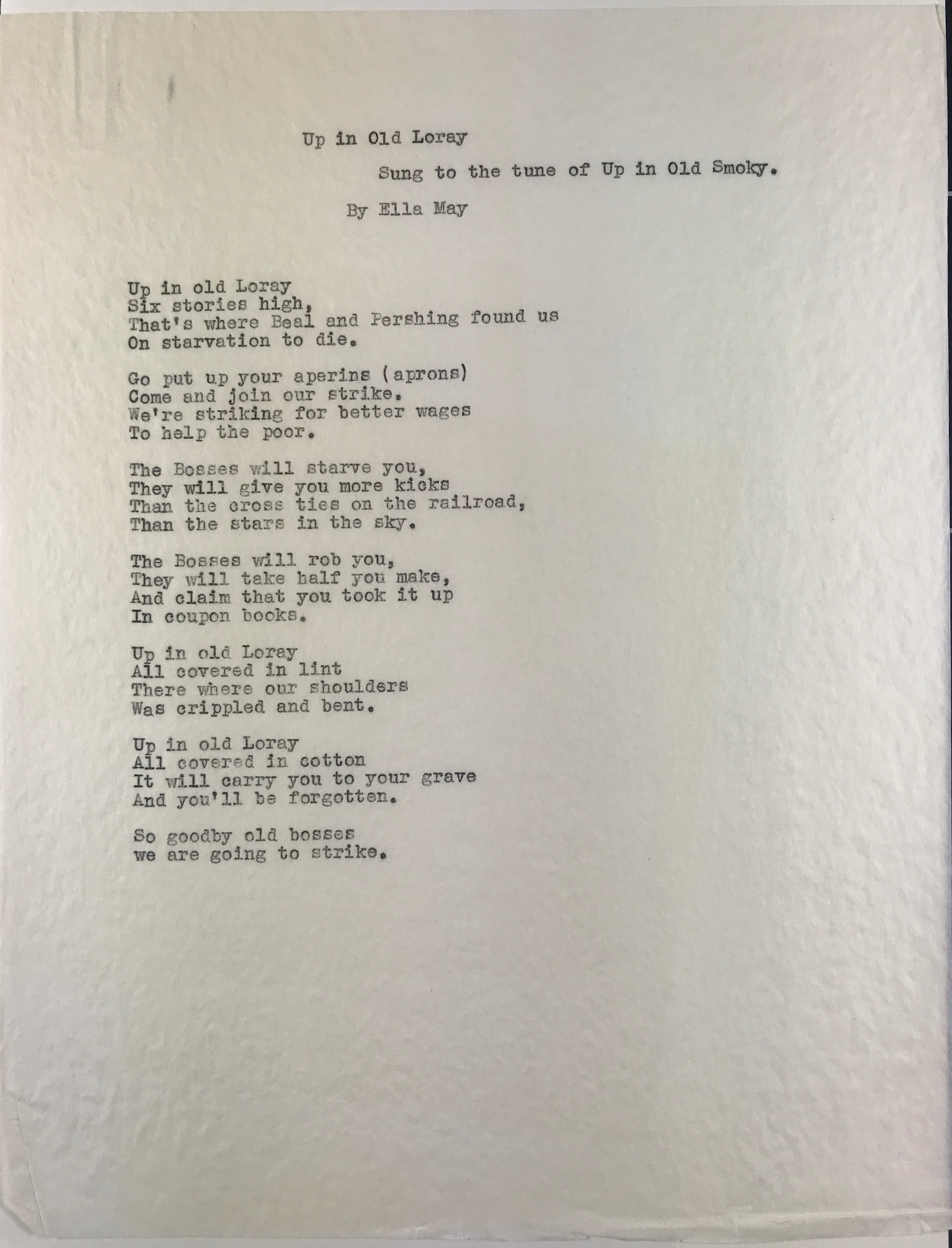
Many of the mill workers that fought for better working conditions during the strikes in 1929 will go unnamed. We are lucky to have Ella May’s songs as a reminder of her spirit and tenacity.
If you are looking to learn even more about Ella May Wiggins, check out The Southern Historical Collection’s oral histories of Ella May’s daughters, Millie Wiggins Wandell and Charlotte Wiggins. These tapes were digitized and are streaming online thanks to our generous grant from the Andrew W. Mellon Foundation.
Cox, Annette. “The Saga of Ella May Wiggins.” Southern Cultures, The University of North Carolina Press, 4 Oct. 2015, muse.jhu.edu/article/594509. Web. 7 June 2019.
Huber, Patrick. “Mill Mother’s Lament: Ella May Wiggins and the Gastonia Textile Strike of 1929.”Southern Cultures, vol. 15, no. 3, 2009, pp. 81-110. Web. 7 June 2019.
Jones, Loyal. “On the Death of Union Organizer and Balladeer Ella May Wiggins, A Tale of Two Families.” Review of Book. Appalachian Journal, vol. 43, no. 3-4, 2016, pp. 252–262. Web. 7 June 2019.
McShane, Chuck. “Tar Heel History: The Loray Mill Strike.” Our State Magazine, 17 May 2015, www.ourstate.com/loray-mill-strike/. Web 7 June 2019.
Category: SFC Mellon
Frank Hovington materials at the SFC
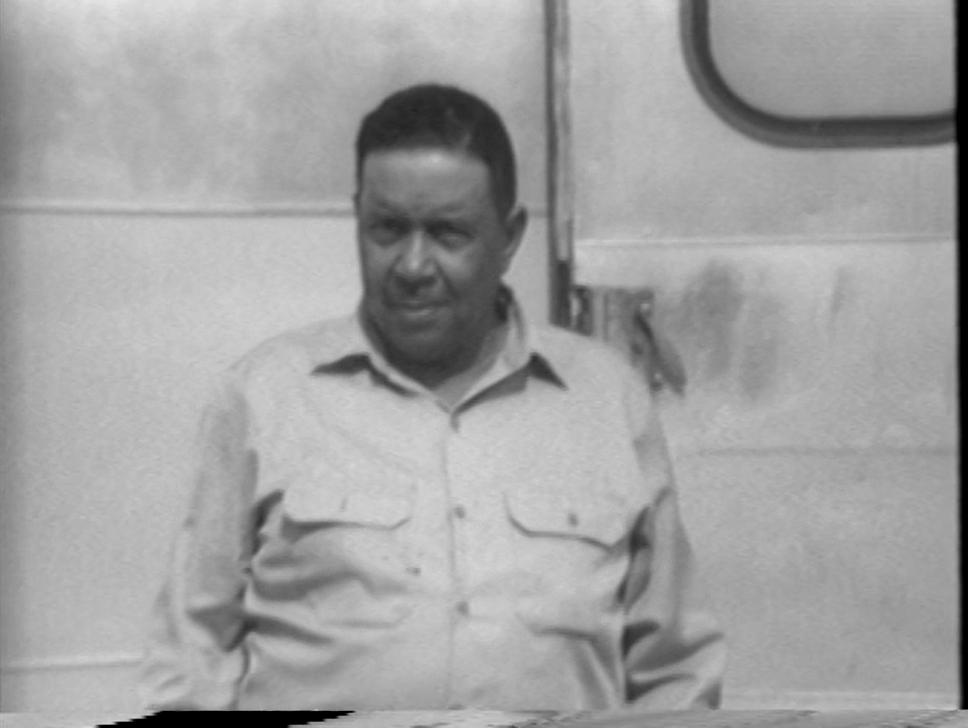
One of my personal favorites in the Robert D. Bethke Collection (20466) is a video recording (VT-20466/21) of Frank Hovington playing guitar and singing at his home in Felton, Deleware back in April of 1978.
The Bethke Collection contains several original analog audio and video recordings of Frank Hovington (1919-1982), an American blues musician who was known for playing his guitar in the Piedmont blues style.
It’s a fascinating story how Frank (aka Guitar Frank), a man who lived the majority of his life in the state of Delaware, began playing the Piedmont blues. Music was in his family (Frank’s grandfather belonged to a fife and drum corps and his paternal uncle played piano and organ), but it was Frank’s neighbor, Adam Greenfield, who influenced him the most. Greenfield was a former Pullman porter from New Bern, North Carolina, who eventually bought a farm and settled about three miles from the Hovington family’s farm. According to Frank,
“They used to have what they called parties on a Saturday night, house-hops, and I would go ’round with my father and sit and hear [Adam Greenfield] play…and that was when I was first inspired to play banjo and guitar through him…I was only around five or six years old and I used to love to get right near him and watch that guitar and watch his fingers when he was playing and my father used to let me go and stay and watch him, so every time he used to be around town, I’d always make it my way to find where he was and listen to that guitar.”*
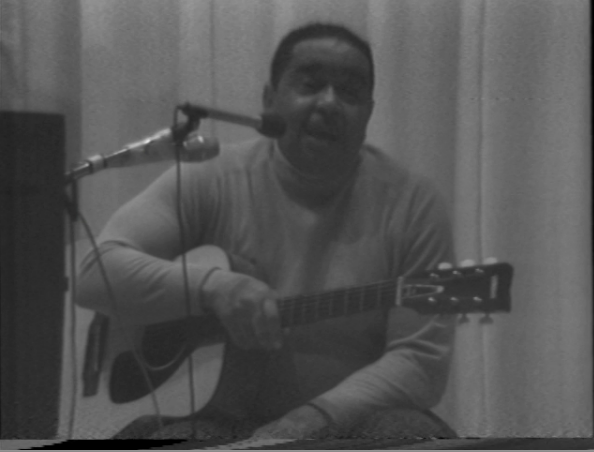
Another video (VT-20466/36, VT-20466/37) in the Bethke Collection documents Frank telling his Piedmont blues origin story to a group of elementary school students. I highly recommend checking this footage out. Not only do you get to see Frank tell his own story, but you also get to hear Frank play his songs to an enthusiastic audience of children, whose little voices and rowdy responses add a really special element to the video.
Now back to the 1978 footage of Frank I mentioned above. Robert D. Bethke, a folklorist who taught courses at the University of Delaware from 1977 to 2000, shot this particular video on portapak, a portable analog video tape recording system introduced in 1967 that made it possible to shoot and record video outside of a studio.
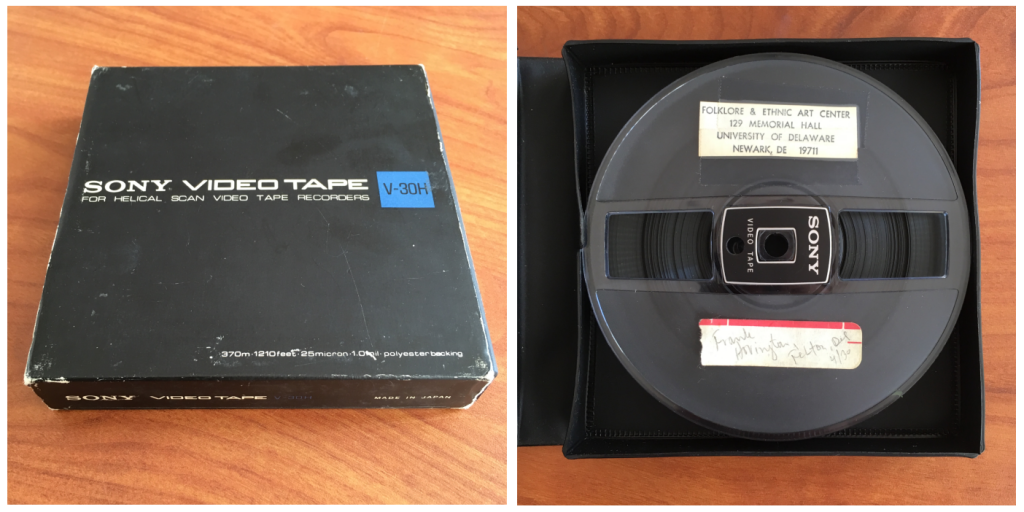
The video features Frank playing such traditional songs as “Railroad Blues” and “John Henry”. We also catch a glimpse of his home and property, on what looks like a nice, sunny spring day.
Thanks to a grant from the Andrew W. Mellon Foundation grant, this particular video (+ over 80 audio and video recordings found in the Bethke Collection!) have been preserved and are now accessible through the Bethke Collection finding aid (streaming access to the collection’s audio and video materials is limited to the UNC campus at this time). For your enjoyment, we’ve edited this short clip that features Frank playing “John Henry” :
"John Henry" lyrics transcribed from video recording VT-20466/21: John asked his captain, When are you goin' to town? If you bring me a twenty pound hammer, Beat a little steel back on down, hey gal Beat a little steel back on Beat a little steel back on down Well, who been here since I been gone? Well, who gonna kiss your rosy cheeks? Well, who gonna shoe your cozy feet? John Henry's woman, she talked so fair Get my shoes from a steel-drivin' man Kisses from a millionaire, hey gal Kisses from a millionaire Kisses from a millionaire John Henry asked his captain, When are you goin' to town? If you bring me a twenty pound hammer, Beat a little steel back on down Beat a little steel back on Beat a little steel back on down Early in the morning, 'bout the break of day Heard a voice in the wilderness, cryin, Well, my side givin' away Well, my left side givin' away Well, my left side givin' away Well, Who been here since I been gone? Well, who gonna kiss your rosy cheeks? Who's gonna be your man? Who's gonna be your man? John Henry's woman, well, she talked so fair Get my shoes from a steel-drivin' man Kisses from a millionaire, hey gal Kisses from a millionaire Kisses from a millionaire Well, who been here since I been gone? John Henry's woman, name was Polly Ann Day she heard John Henry died She drove steel like a man, hey gal She drove steel like a man She drove steel like a man
Frank may be best known for his album Lonesome Road Blues, which like the video clip above, features intimate home recordings of Hovington, but this time on guitar, vocals, AND banjo. Folklorist, Bruce Bastin, and musicologist, Dick Spottswood, made the album recordings at Frank’s home over a July weekend in 1975, just three years before Bethke made his way to the same address. The album was released by Bastin’s label, Flyright Records, in 1976 (FLY LP 522) and then again by Rounder Records in 1979 (Rounder Records 2017).
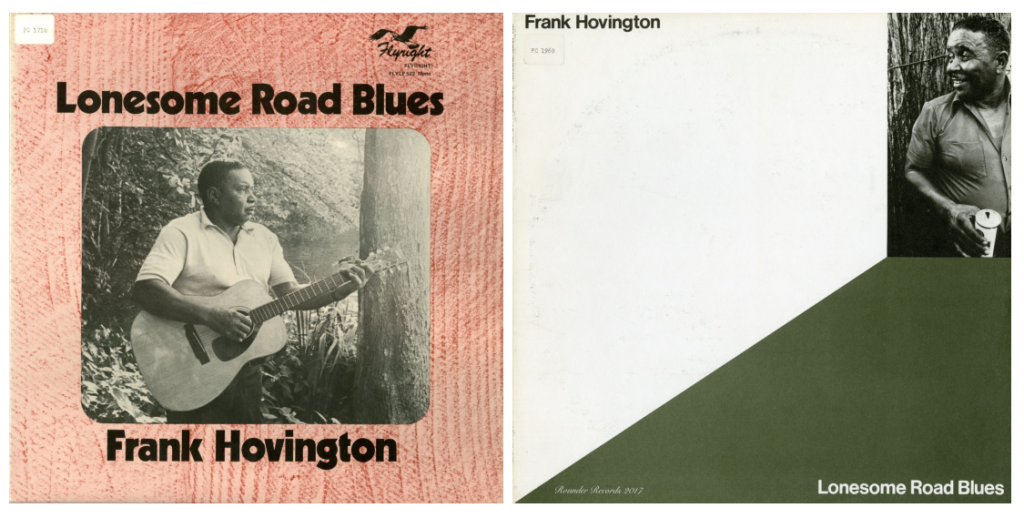
The Southern Folklife Collection has copies of both of these releases (pictured above), as well as materials relating to the Flyright release in the Bruce Bastin Collection (20428). We invite you to dig through all of these materials across SFC’s collections to get to know Frank Hovington and his music. A good start may be Bastin’s impressive liner notes on Lonesome Road Blues, as well as the subject files and images of Frank found in the Robert D. Bethke Collection. Happy sleuthing.
*Frank Hovington quote taken from Bruce Bastin’s liner notes to Frank Hovington: Lonesome Road Blues.- Flyright FLYLP 522 (1976)
Congratulations Bill Ferris! "Voices of Mississippi" box set wins two Grammys

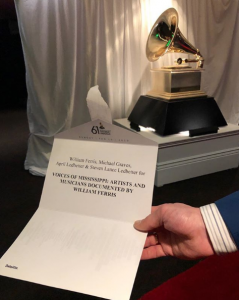
We were thrilled to see our colleague, collaborator, and constant source of inspiration Dr. William R. Ferris honored with two Grammy awards at yesterday’s ceremony for the box set Voices of Mississippi: Artists and Musicians Documented by William Ferris. Ferris, along with compilation producers April Ledbetter and Lance Ledbetter of record label Dust-to-Digital and mastering engineer, Michael Graves, received Grammy recognition for “Best Historical Album” and Ferris, along with David Evans, also won for “Best Album Notes.” Materials for the box set come from the William R. Ferris Collection (20367) that is part of the Southern Folklife Collection at Wilson Special Collections Library here in the University Libraries at UNC Chapel Hill.
Over the past decade, archivists, audio engineers, photo technicians, students, researchers, and Bill Ferris himself have worked to arrange, describe, and digitize the more than 250,000 sound recordings, photographs, videos, films, papers, and ephemera that make up the William R. Ferris Collection. Thanks to the dedicated teams at Wilson Library and with support from the National Endowment for the Humanities and the Andrew W. Mellon Foundation, a few thousand of these sound recordings, videos, films, and photos are digitized and can be streamed or viewed in their entirety online. It’s exciting to think of listeners hearing a track on Voices of Mississippi and then be able to find that recording and many others in the William R. Ferris Collection (20367) finding aid. They may want to hear more of Lovey Williams, or to hear James “Son” Thomas playing in a juke joint, or Fannie Bell Chapman singing in her back yard
few thousand of these sound recordings, videos, films, and photos are digitized and can be streamed or viewed in their entirety online. It’s exciting to think of listeners hearing a track on Voices of Mississippi and then be able to find that recording and many others in the William R. Ferris Collection (20367) finding aid. They may want to hear more of Lovey Williams, or to hear James “Son” Thomas playing in a juke joint, or Fannie Bell Chapman singing in her back yard
| SFC Audio Open Reel FT-20367/10256 |
Ferris Folklore Tapes: James “Son” Thomas, Shelby Brown. FFT 41-69-5/24 |
| SFC Audio Open Reel FT-20367/11175 |
Lovey Williams blues |
| SFC Audio Open Reel FT-20367/9958 |
Fannie Bell Chapman: Singing in back yard, 10 August 1973. FCT 68-73-8/10 |
These examples are the smallest sample of the opportunities available to interested researchers and listeners and explorers of the rich cultural history and beautiful human artistry documented by Dr. Ferris. B. B. King recorded at home, extensive conversations with brilliant minds like Eudora Welty, Walker Evans, Alice Walker, tales told by Ray Lum and Victor Bob and many, many others are streaming online. There are also thousands of photographs digitized and searchable through the William R. Ferris Collection Digital Photographs.

It is exciting to see recognition for the work that Dr. Ferris dedicated his life to. It is also exciting to see recognition for the people of Mississippi who, in Bill’s words, “so courageously shared their stories.”
That list is long, but to start, thanks to Scott Dunbar, Lovey Williams, Walter Lee Hood, Tom Dumas, Mississippi Fred McDowell, Wash Heron, Wallace “Pine-Top” Johnson, Sonny Boy Watson, Mary Alice McGowan, The Southland Hummingbirds, Liddle Hines, Mary and Amanda Gordon, Reverend Isaac Thomas, Bobby Rush, Barry Hannah, Joe Cooper, Joe Skillet, Shelby “Poppa Jazz” Brown, Pete Seeger, Charles Seeger, Imamu Amiri Baraka, Victor Bobb, Cleanth Brooks, Fannie Bell Chapman, Edith Clark, Leon “Peck” Clark, Bill Clinton,
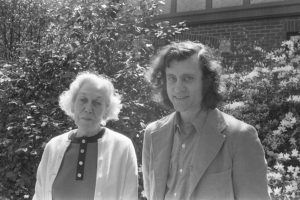
Hillary Rodham Clinton, Willie Dixon, John Dollard, Louis Dotson, Walker Evans, Marcie Cohen Ferris, Shelby Foote, Ernest J. Gaines, Allen Ginsberg, Theora Hamblett,Bessie Jones, B.B. King, Alan Lomax, Ray Lum, Arthur Miller, Ethel Wright Mohamed, Ola Belle Reed, Harry Smith, James “Son” Thomas, Othar Turner, Alice Walker, Pecolia Warner, Robert Penn Warren, Eudora Welty, and members of the Rose Hill Baptist Church in Vicksburg, Miss.
Our sincerest thanks and gratitude to all of these individuals and many more unnamed, for their willingness to share parts of their lives with Dr. Ferris and then with all of us. But once more, many congratulations to our friend Bill Ferris and his fellow award winners Lance, April, Michael, and David. We can’t wait to hear what stories you will turn up next.
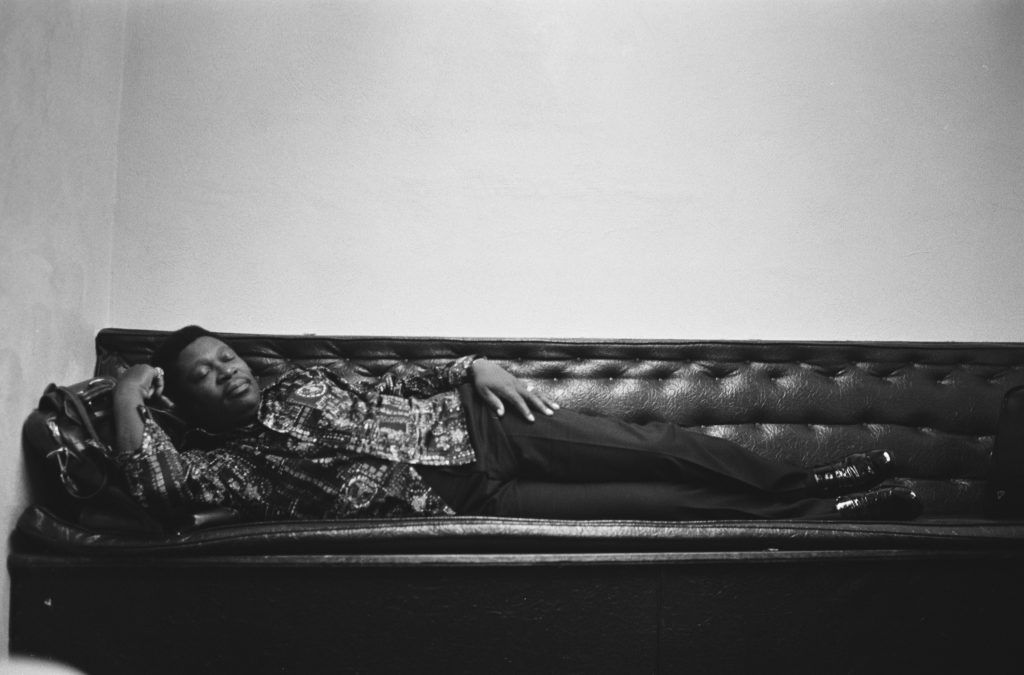
Southern Artists in the Judith McWillie Papers
Last year we digitized over 100 videos from the Judith McWillie Papers documenting a diverse set of artists at work. Focusing primarily on southern artists (with an emphasis on Georgia natives), McWillie spent hours filming in homes, studios and yards from the mid-1980s to late 1990s before focusing her lens on Cuban art in the 2000s.
Below is a sampling of screenshots from some of these videos, which were originally brought to the Southern Folklife Collection on Video8 or VHS, and are now available through the Judith McWillie Papers finding aid (20455).






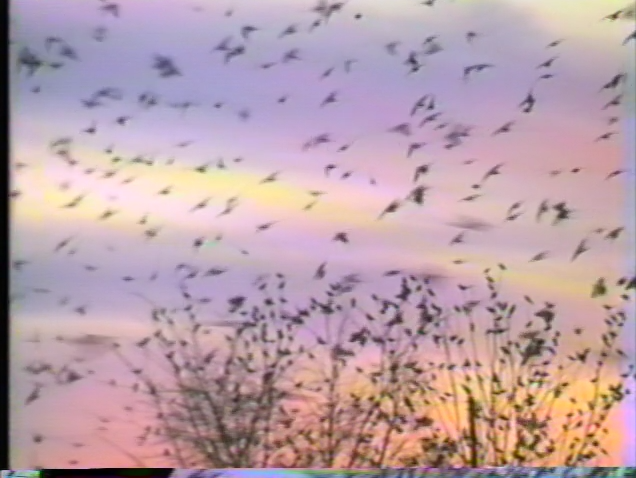
Judith McWillie is professor emeritus of drawing and painting at the Lamar Dodd School of Art at the University of Georgia. Preservation and access to these materials was made possible by funding through our Andrew W. Mellon Foundation grant, Extending the Reach of Southern Audiovisual Sources.
Mark J. O'Donnell Collection Tape Addition
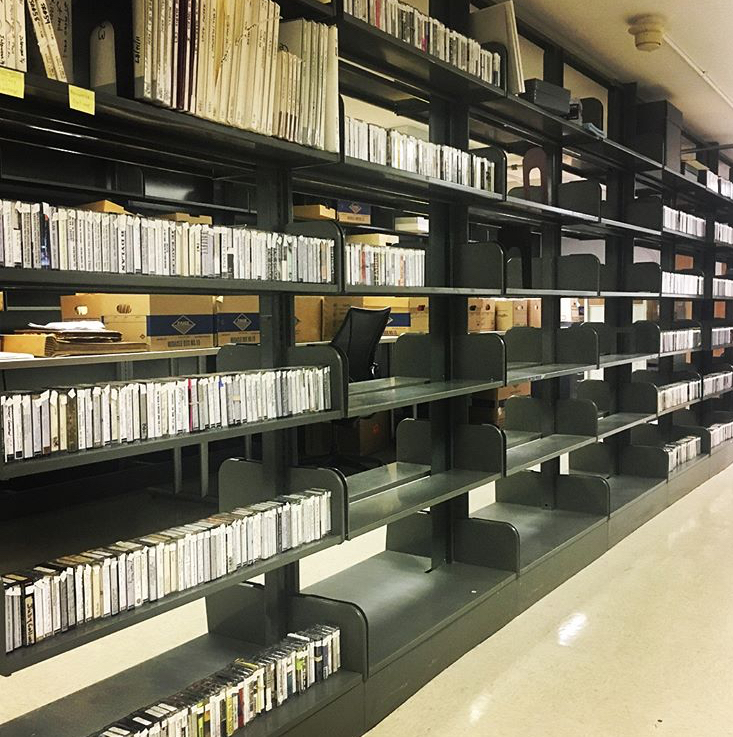
Tape collector Mark J. O’Donnell has collected and recorded live audio recordings of bluegrass, blues, jazz, and rock music in North Carolina and all across the country. The Mark O’Donnell Collection (#20555) consists of materials related to concerts and festivals at North Carolina area venues, including Cat’s Cradle, Arts Center, as well as some national venues and radio programs, including McCabe’s Guitar Shop in Santa Monica, Calif. and the Los Angeles based syndicated music program, FolkScene.
Over the past two months, we have arranged and described an additional 1,929 audiocassettes and DATs that will be added to the collection as a part of the next phase of a grant from the Andrew W. Mellon Foundation.
While many of the performances recorded on these tapes are located at venues across the US, a number of these recorded performances are in the Tarheel State. We’ve chosen to highlight some of our favorite North Carolina recordings from these tapes here.

This addition of tapes to the O’Donnell collection contains numerous recordings from Merlefest, specifically from the years 1992-2004. This festival has long buttressed the community for roots and traditional music by providing a space for performers such as Doc Watson, Jimmie Dale Gilmore, Earl Scruggs, Gillian Welch, Alison Krauss and Steve Earle. According to the festival’s website, “MerleFest, considered one of the premier music festivals in the country, serves as an annual homecoming for musicians and music fans. Held on the campus of Wilkes Community College in Wilkesboro, North Carolina, MerleFest was founded in 1988 in memory of the late Eddy Merle Watson, son of American music legend Doc Watson. MerleFest is a celebration of ‘traditional plus’ music, a unique mix of music based on the traditional, roots-oriented sounds of the Appalachian region, including bluegrass and old-time music, and expanded to include Americana, country, blues, rock and many other styles.” The annual event continues to grow and thrive, year after year, and is the primary source of funding for the Wilkes Community College Foundation.
You can experience Merlefest for yourself this April 25-28, 2019. Until then, you can listen to these iconic Merlefest recordings from the O’Donnell collection by visiting the Southern Folklife Collection at UNC. Visit the Merlefest website here.
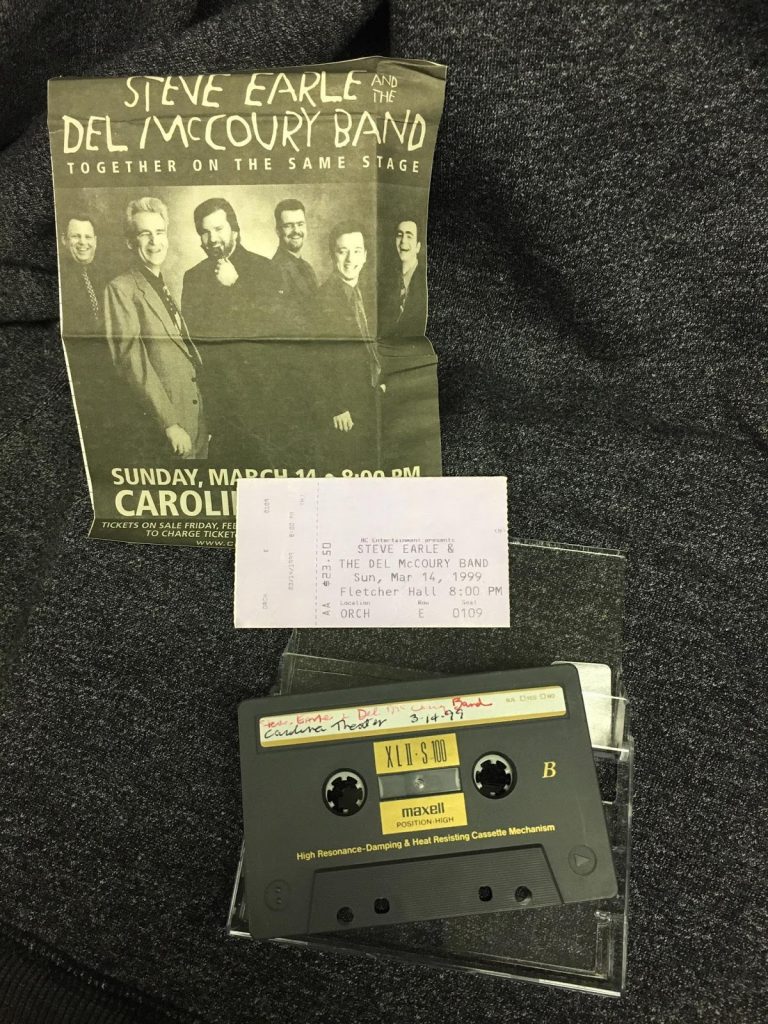
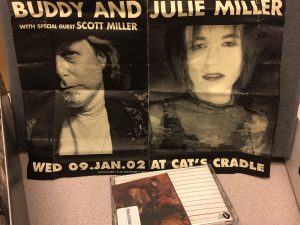
In addition to many other regional, national and international recordings, O’Donnell has also provided us with documentation of performances from our local music venues over the past few decades including: concert posters, fliers, artist photos, programs, and ticket stubs. Venues such as the Cat’s Cradle in Carrboro and the Carolina Theatre in Durham have provided a solid foundation for both local musicians to perform, and for the residents of the area to experience a wide breadth of styles and genres of live music. Visit our finding aid to find out more about the fantastic local recordings and more included in the Mark J. O’Donnell Collection. Due to copyright issues, the recordings in the O’Donnell collection will be available for research use in Wilson Library only. Rights for the recordings are held by the authors of the work. Information for interested researchers can be found on our website here.
Happy 2019! A look back at 2018.
All of us at the Southern Folklife Collection want to wish you a very happy new year. 2018 was a very productive one for the SFC:
2018 was the second year of our partnership with YepRoc Records and saw the release of three new recordings. In February, we released Doc Watson, Live at Club 47 with a record release party at Club Passim featuring songwriter and 2017 IBMA Guitar Player of the Year Molly Tuttle accompanied by her bandmates in The Goodbye Girls, Allison de Groot, Lena Jonsson, Brittany Karlson and guitarist and singer Stash Wyslouch. Live at Club 47 documents Doc Watson in top form recorded in February 1963, between his first solo public performance at Gerdes Folk City in New York City in November 1962 and his breakthrough performance in August 1963 at the Newport Folk Festival. 55 years after the recording, Live at Club 47 reached #9 on Billboard’s Bluegrass Album Chart.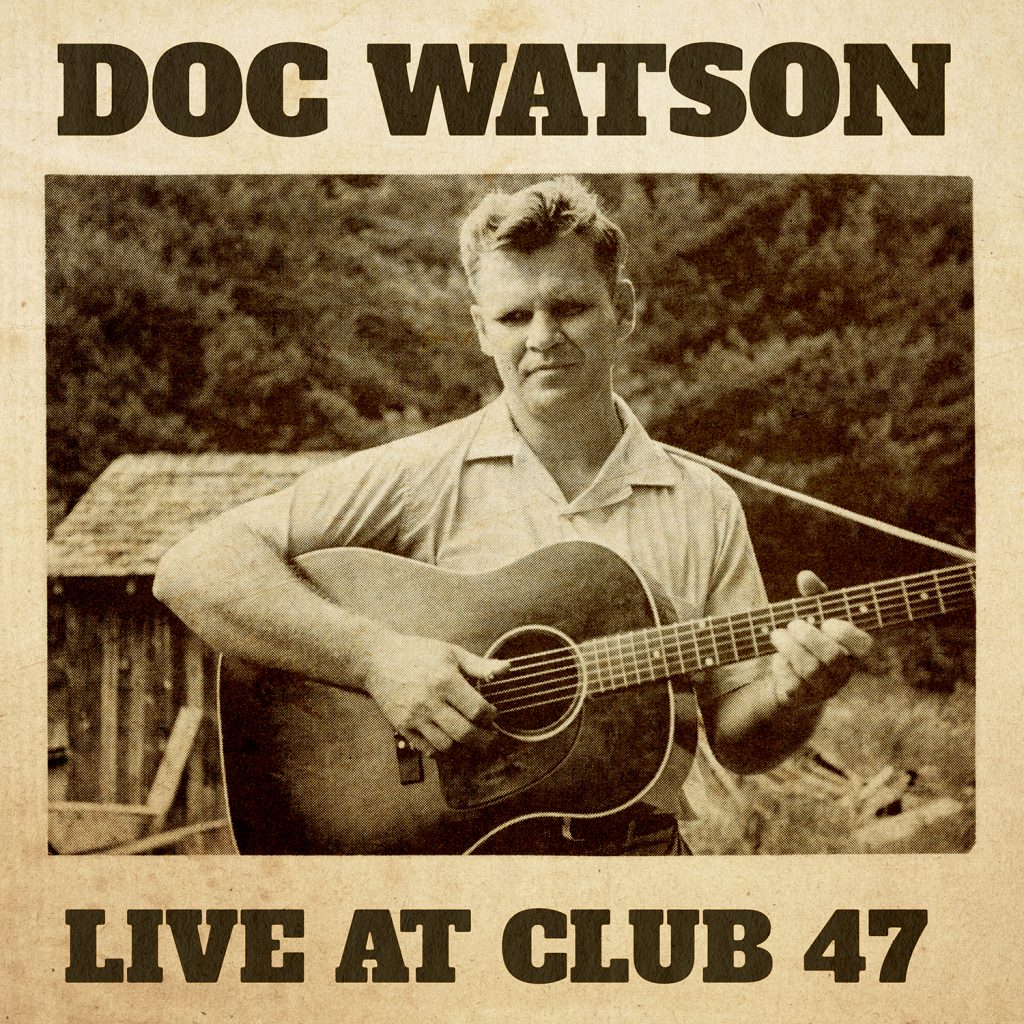
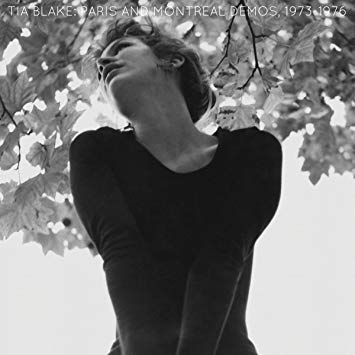 In March we released a special 10” vinyl EP for Record Store Day, Tia Blake, Paris and Montreal Demos 1973-1976. Tia released only one record in her lifetime, Folksongs & Ballads, for a small record label in France. Her demos had briefly been available on a CD reissue by Water Records that had quickly gone out of print. We hated to see this material unavailable to a broader audience, and with both Tia’s and her mother Joan’s blessing, made the tracks available again on vinyl, newly remastered by Brent Lambert of Kitchen Mastering, from the SFC’s 24bit 96kHz transfers of the analog masters. The demos are intimate and beautifully sung in Tia’s rich melancholy voice. The recordings are some of our favorites in the collection.
In March we released a special 10” vinyl EP for Record Store Day, Tia Blake, Paris and Montreal Demos 1973-1976. Tia released only one record in her lifetime, Folksongs & Ballads, for a small record label in France. Her demos had briefly been available on a CD reissue by Water Records that had quickly gone out of print. We hated to see this material unavailable to a broader audience, and with both Tia’s and her mother Joan’s blessing, made the tracks available again on vinyl, newly remastered by Brent Lambert of Kitchen Mastering, from the SFC’s 24bit 96kHz transfers of the analog masters. The demos are intimate and beautifully sung in Tia’s rich melancholy voice. The recordings are some of our favorites in the collection.
July saw the release of Bluegrass Champs, Live from the Don Owens Show. These rare live 1950s radio broadcasts featured Scotty, Donna, Van, and Jimmy Stoneman of the Stoneman Family.
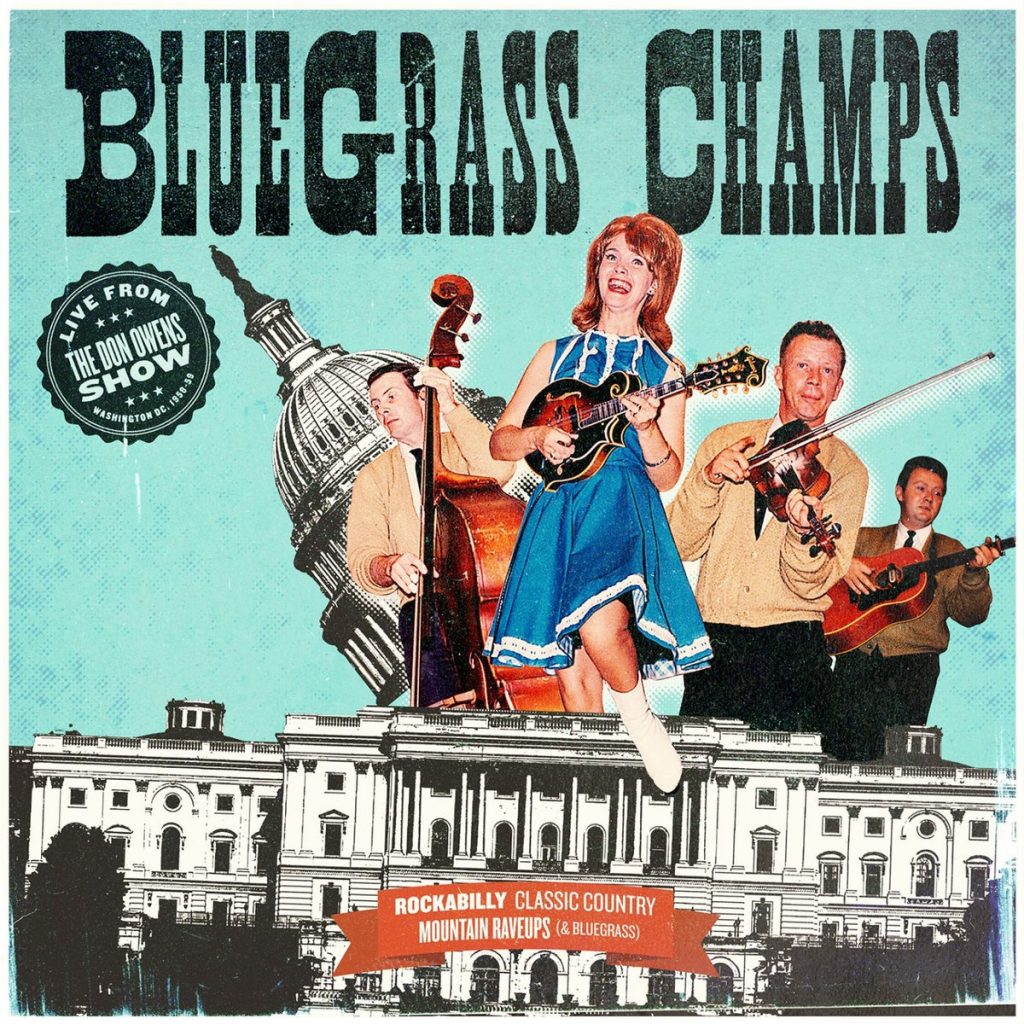
The recordings came from the legendary private collection of Leon Kagarise and were produced by Joe Lee of Joe’s Record Paradise. Live from the Don Owens Show reached #2 on Billboard’s Bluegrass Album chart.
At the end of July, we completed the implementation phase of Extending the Reach of Southern Audiovisual Sources, our 2015-2018 grant from the Andrew W. Mellon Foundation. The grant has been transformative, allowing us to implement large-scale preservation and access workflows for archival audio and video holdings of the Southern Folklife Collection. This August we started a new expansion phase of the grant to broaden the focus to all archival AV materials in the Wilson Special Collections Library and to pilot AV digitization services for partner institutions across the state through UNC Libraries’ North Carolina Digital Heritage Center.
Another key initiative has been providing access to our collections backlog. In 2018, brief online finding aids and library catalog records were created for many of the SFC’s hidden collections. We hope to complete this process and have all of the SFC’s collections discoverable in 2019. For an updated listing of our collections visit our website.
My thanks for your continued support! We are looking forward to 2019, which is the 30thAnniversary of the SFC’s official opening. We have a number of events and exhibits planned. More news to come.
Preservation Update – new hires and online recordings
Our efforts to expand and improve on audiovisual preservation continue here in Wilson Library, with the recent hiring of our third Audio Engineer, Dan Hockstein, and two Audiovisual Archives Assistants, Mel Meents and Andrew Crook. These positions have been funded by the Andrew W. Mellon Foundation as part of our Extending the Reach of Southern Audiovisual Sources: Expansion grant. This phase of the project scales the digitization and preservation work we’ve done for the SFC to all of Wilson Special Collections AV.
Andrew, Mel and I have recently moved into a new space in Wilson Library’s Digital Production Center, and we now have an official AV Lab to call our own in addition to the Ben Jones and John M. Rivers Jr. audio studios. Mel and Andrew have stayed busy working across collections in the building, producing item-level descriptions for videotapes in the University Archives’ Student Television at the University of North Carolina at Chapel Hill collection (#40326), prepping films for cool storage from the Florentine Films Archives (#20193), and managing monthly pre and post-digitization tasks.
Audio and video equipment in our new AV lab location
The audio engineers have been running tapes and discs, covering large sections of the Bruce Bastin Collection (#20428), Paul Brown Collection (#20382), William R. Ferris Collection (#20367), Apollo Records Collection (#20539-z), and North American Traditions Collection (#20503) among many others. Since August we have digitized, preserved, and provided online streaming to over 1,300 audio recordings.
A batch of 1/4" audiotapes waiting digitization
Our Technical Services department has also been working hard to decrease the number of collections in the SFC backlog, creating collection level finding aids for over 70 collections! Our AV Archivist Anne Wells and processing assistants, Rae Hoyle and Emma Evans, have completed or provided additions to a number of SFC finding aids, including the Berea College Collection of John Lair and Lester McFarland Recordings (#20281), Nancy Hamilton Collection on Molly Sequoia (#20125-z), and North Carolina Symphony Recordings (#20390-z).
Our photo stand for photographing items in the collection
In early 2019 we look forward to sending off our next batch of video priorities for digitization to our vendor. These items will be joined by recordings from a few of the regional institutions we have partnered with as part of an initiative in the grant to provide services to external collections, including Appalachian State University and North Carolina State Archives. More on that soon!
Now Available for Research: Duck Kee Studio Collection
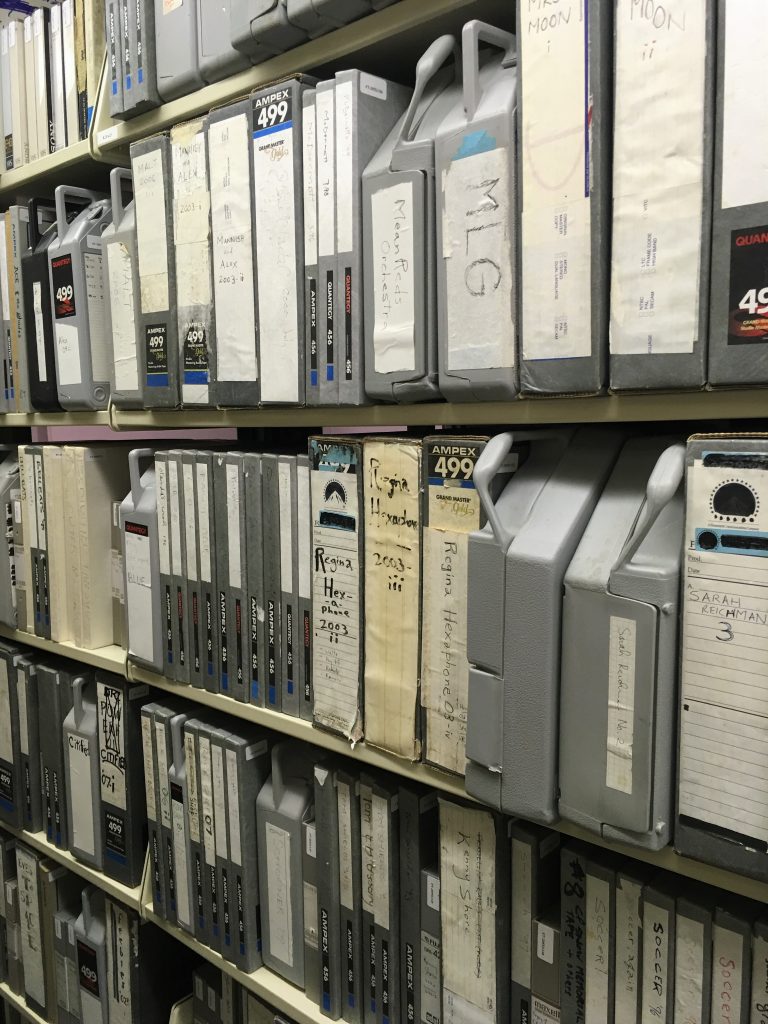
This week we published a new finding aid for the Duck Kee Studio Collection (20553), which contains multi-track and mixdown studio master tapes of Triangle favorites recorded at Duck Kee Studio from 1984-2009. Recordings are on 2″ open reel, 1/2″ open reel, and ADAT analog formats.
Duck Kee Studio was founded by musician and recording engineer, Jerry Kee (Dish, Regina Hexaphone, Cat Toy), who began recording local bands out of a house in Raleigh in the late 1980’s. In 1995, Kee relocated the studio to Mebane, N.C., its eighth location.
The studio has close ties to the Triangle’s indie rock music scene, recording early work by Archers of Loaf, Tift Merritt, Pipe, Polvo, and Superchunk, among others. Kee has historically relied on analog recording equipment, including a 4-track and later a 24-track tape machine.
In January 2018, Duck Kee Studio no. 8 was tragically damaged in a fire. Kee recently talked with WUNC’s “Songs We Love” podcast about the fire, which destroyed his recording equipment and severely damaged open reel tapes stored at the studio.
Thankfully Kee donated a large batch of master tapes (about 175 in total) to the Southern Folklife Collection before the studio fire. These tapes are featured in the newly published finding aid and include recordings by local acts, like Cobra Kahn, Dish, Eyes to Space, Jennyanykind, Malt Swagger, Picasso Trigger, Portastatic, Queen Sarah Saturday, Regina Hexaphone, Schooner, and Superchunk.
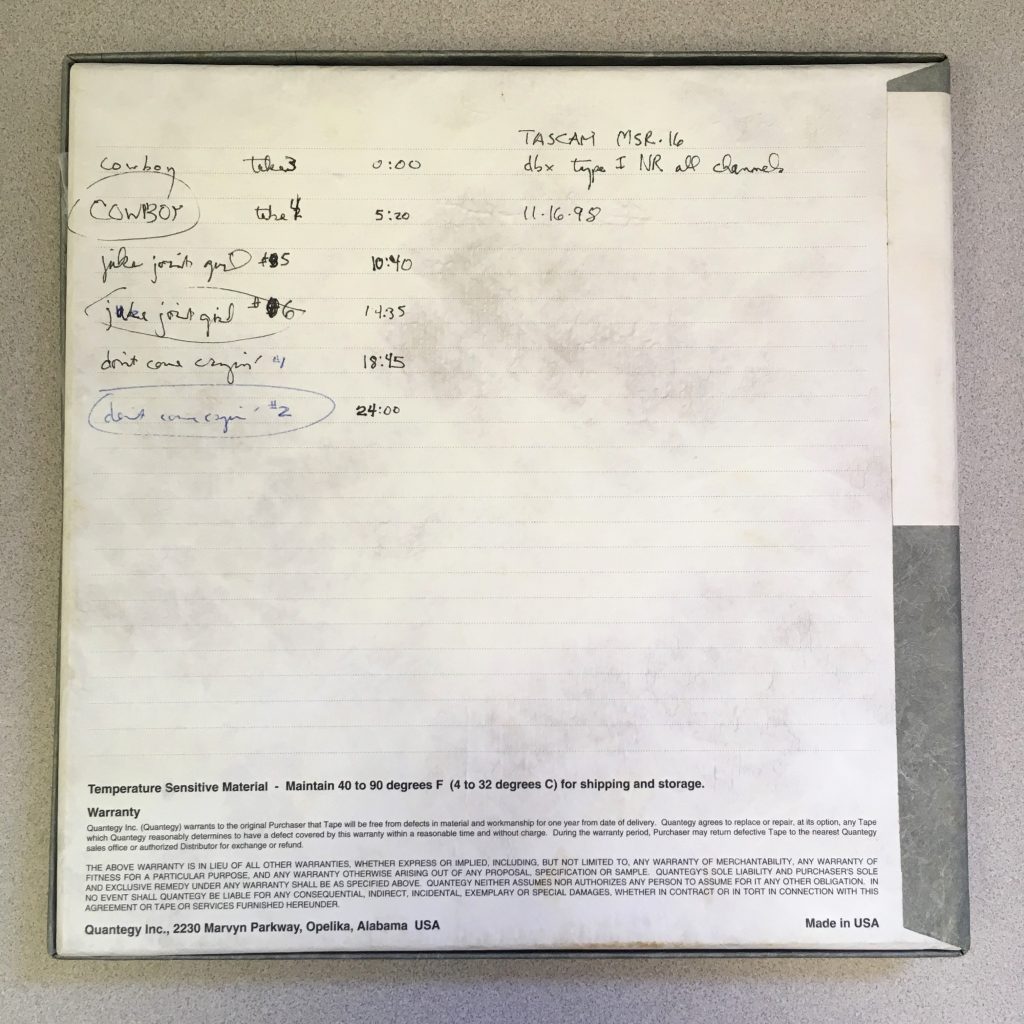
The collection also includes an early recording of Tift Merritt with her full band, dubbed The Carbines, which included Margaret White on fiddle, Christopher Thurston on bass, Greg Readling on keyboard and pedal steel, and Zeke Hutchins on drums. Above is an image of their fall 1998 recording that resulted in a self-released 7-inch single featuring “Juke Joint Girl” and “Cowboy” (1999, Oil Rig Music).
Duck Kee Collection materials are available for research on-site at Wilson Special Collections Library. The collection is a nice addition to the SFC and its growing collection of materials related to the Triangle’s independent music scene (Ron Liberti Collection, Merge Records Collection, Tift Merritt Collection, and Craig Zearfoss Collection, to name a few).
Remember those fire damaged tapes I mentioned earlier? About 170 of them arrived at SFC this past spring via Jerry Kee. We are currently assessing the tapes conditions and crafting a plan of attack to help preserve and provide access to the them. Stay tuned. Sending lots of positive thoughts and energy Jerry Kee’s way. We are hopeful that most of the damaged tapes can be salvaged.
And last but not least, shout-out to our graduate research assistant, Rae Hoyle, who helped process the Duck Kee Studio Collection – thank you, Rae!
Martin Luther King, Jr. speaking from Birmingham, 1963
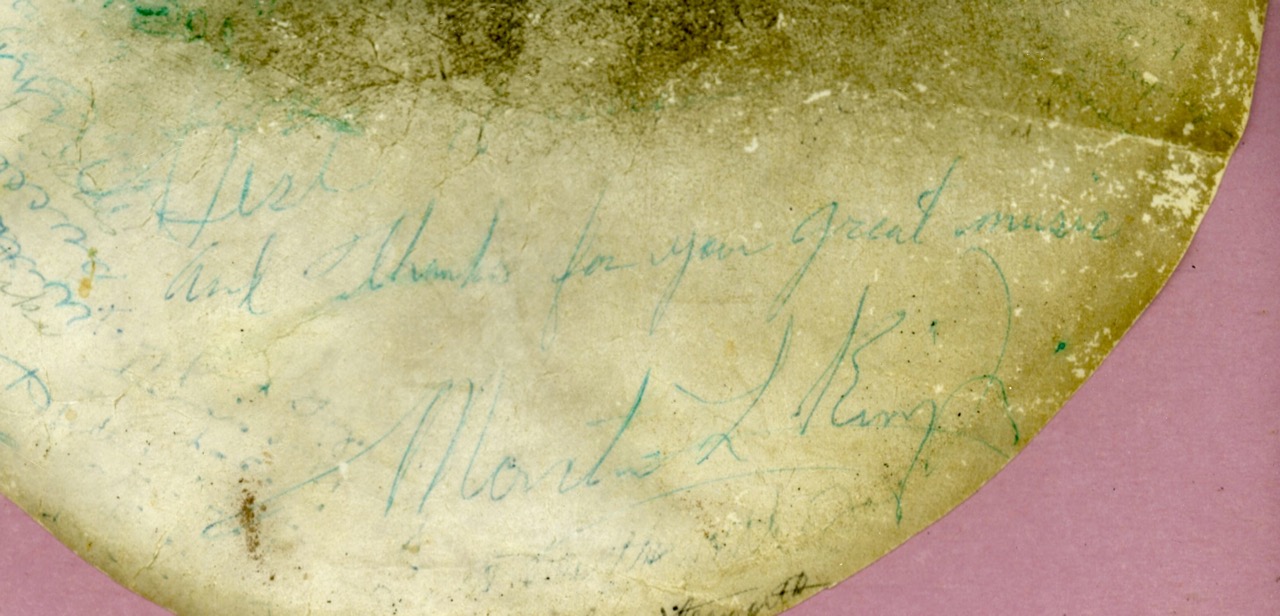 Like many of you today, we remember Dr. Martin Luther King, Jr. and his legacy by turning to his own voice and words. In that spirit we’d like to share a clip of a speech Dr. King made to a group of organizers and activists at a Mass Meeting in Birmingham, Alabama, April 1963, digitized from open reel tape recording FT-20008/9832 in the Guy and Candie Carawan Collection (20008). He addresses the audience with seriousness and humor, inspiring them to continue to fight for the cause and lifting them up in solidarity before they all join together to sing “We Shall Overcome”. Listen to those clips here or read the transcription below:
Like many of you today, we remember Dr. Martin Luther King, Jr. and his legacy by turning to his own voice and words. In that spirit we’d like to share a clip of a speech Dr. King made to a group of organizers and activists at a Mass Meeting in Birmingham, Alabama, April 1963, digitized from open reel tape recording FT-20008/9832 in the Guy and Candie Carawan Collection (20008). He addresses the audience with seriousness and humor, inspiring them to continue to fight for the cause and lifting them up in solidarity before they all join together to sing “We Shall Overcome”. Listen to those clips here or read the transcription below:
[Speaking: Rev. Charles Billups]:
Now let us join hands and let us sing together, “We Shall Overcome”
[singing]
We shall overcome
We shall overcome
We shall overcome someday,
Oh deep in my heart
I do believe
We shall overcome someday.
You can hear the entire tape, as well as interviews and comments from participating student actives, streaming through the Southern Folklife Collections digital collections here: FT-20008/9832. Digitized recordings in the Guy and Candie Carawan Collection have been made accessible through streaming thanks to SFC’s ongoing audiovisual preservation grant from the Andrew W. Mellon Foundation.
The photo above is a closeup of Guy Carawan’s banjo head (pictured in full below), signed by Martin Luther King, Jr. as well as other leaders like Rosa Parks, Mahalia Jackson, Septima Clark, Fred Shuttlesworth and more. If you are interested in other archival materials related to Martin Luther King, Jr. you may want to read an article from today’s News and Observer, April 4, 2018, “Martin Luther King, Jr. and Chapel Hill’s Jim Crow Past,” by journalist Mike Ongle. The article based on research across the collections at Wilson Special Collections Library and details Martin Luther King’s visit to Chapel Hill and UNC Chapel Hill in May of 1960, including photos from the John Kenyon Chapman Papers (05441) .